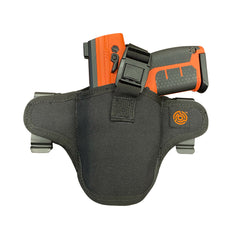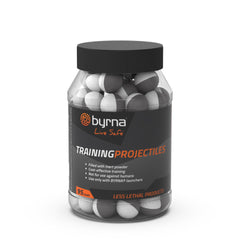
Pepper spray can give you a way to defend yourself when talking just doesn't work anymore. It stops threats for a little while without causing permanent harm. However, you'll need to complete the proper training before you can carry it while you're working.
You have to make serious decisions about pepper spray every day as a security guard. There are laws about who can carry pepper spray and about the proper training that you must complete to be certified. There are also limits on when you can use it, and your company may have stricter rules than what your state says is okay. When you know how to use it and what could go wrong, you make yourself and your company safer from running into problems.
I'm going to answer the most common questions that security guards have about legally carrying pepper spray. You should probably know what you can and can't do before you attach the spray to your belt.
Let's get started by looking at the things that matter for security guards!
Table of Contents
Can Guards Carry Pepper Spray?
Yes you can carry pepper spray as a security guard in most states! However the rules can change based on where you work. Some places have tight laws while others make it pretty easy for security guards to carry this tool.
In some states, you'll need to complete training before you can carry pepper spray. This training will teach you when it's okay to use it and how to use it without hurting yourself or others too much. If you don't finish the training, you might not be allowed to carry it at all. These classes usually explain what pepper spray does to people and when it makes sense to use it.
Some states have restrictions on how big your pepper spray can be or how strong it is. For example, in New York, security guards can carry only small canisters that are no bigger than 0.75 ounces and in Wisconsin, you can only use OC pepper spray instead of the stronger tear gas types that might be allowed elsewhere.

Your workplace matters when it comes to carrying pepper spray. You may find that places like schools, government buildings, and airports don't allow it at all, even if your state permits security guards to carry it. Sometimes, the rules in your city or county are even tighter than those set by the state.
California handles things its own way for security guards and you need training and a permit there, which is stricter than in other states. They take pepper spray very seriously because it can hurt people if it isn't used correctly and the training in California covers legal issues along with proper usage.
The security company you work for may have its own restrictions on pepper spray as well, and these company policies can be stricter than the law requires. Some businesses want you to get extra training or permission before you carry it while you're working, while others don't allow their guards to carry it at all. These rules try to find a middle ground between keeping people safe and giving guards a way to protect themselves. Pepper spray can help you manage problems without deadly force. But the laws are in place to make sure it isn't used incorrectly. Guards who have used pepper spray the wrong way have ended up in court and faced serious legal problems.
Mandatory Training And Certifications
You'll need to get the right training to carry pepper spray when you're working as a security guard. Most states have restrictions on this, and you'll usually spend between 4 and 8 hours in training, depending on where you're working. These training classes teach you when it's okay to use your pepper spray, and you'll get to practice how to spray it, too. The training also covers what you need to do after someone has been sprayed, such as giving basic first aid and helping them recover from the spray's effects.
One of the main things you'll learn is that pepper spray should only be used when you have no other choice. The training can give you better ways to manage tough situations, and you'll pick up de-escalation skills that help you calm tense moments just by talking without having to use force at all. If you don't get the training, you could end up in serious trouble.
You might hurt someone without meaning to, your company could get sued because of your actions, and you could even lose your job or face charges. That's not something anyone wants to deal with.

The rules for this training aren't the same everywhere. In California, you need to take certification courses. New York requires you to complete an 8-hour training program before you start working with pepper spray, and in Texas, you can't use pepper spray until you finish their Level III training.
Your certification won't last forever, either. You'll probably need to redo your training every year or two, which guarantees that you stay up-to-date on the best ways to manage situations and helps you remember how to use pepper spray safely. Businesses don't take these requirements lightly because they don't want guards carrying weapons without the right training, and the dangers are just too high.
Their insurance might not even cover incidents that happen with untrained staff, which could cost them tons of money if they get sued. This training also makes you feel more confident in your job, and learning when and how to use your tools actually makes everyone safer in the long run.
Possible Misuse And Liabilities
Security guards who use pepper spray when they don't need to can end up with pretty serious problems. You might get fired from the job even if you think you're doing the right thing. Guards might get scared when things get tense and reach for their spray instead of trying another option and this can cause serious issues for everyone involved.
When a guard goes too far with pepper spray, the courts usually side with the person who got sprayed. In one case, a company had to pay over a million dollars because a guard pepper-sprayed someone who wasn't even fighting back. That's a huge amount of money that could've been avoided if the guard had made a better choice. The security company is usually the one that has to pay up when these legal problems occur.
You could also face criminal charges if you spray someone without a good reason. These might be assault charges, just like if you had actually hit the person. When you get charges like these, it can make it tough to find another security job for years. The state licensing board might also revoke your security license.

Another thing to keep in mind is that pepper spray can affect people in different ways. Some people have health problems like asthma, which can make pepper spray dangerous for them. What seems like an easy spray could turn into a serious medical problem that nobody wanted to happen. That's why you need training before you start carrying spray on the job.
When you spray indoors, it has its own set of problems because the spray can bounce off walls and reach people who weren't even involved. The spray can also linger in the air and cause problems for people who had nothing to do with what was happening.
If you do end up using your spray, writing everything down is very important. Without a report about why you used it, you're setting yourself up for all kinds of problems. Guards sometimes skip writing this report because they're stressed after using their spray. Your report needs to explain what threat you identified and why you couldn't use any other strategy to manage the situation.
Spray Or Gel: Which Is Better?
Security guards always have to remember whether to use regular pepper spray or the newer pepper gel. Both types have ingredients that make people's eyes burn and swell up and they come in different forms and work differently.
Pepper spray comes out as a fine mist that goes all over the place. You'll cover more area, which helps when you have more than one person. But if it's windy, the spray might blow back at you. You could end up hurting yourself or others who aren't involved.
Pepper gel is more like a sticky stream that the wind doesn't affect as much. It sticks to whatever it hits and doesn't float around in the air, and most gel types can shoot farther than regular spray. You can usually hit someone from about 18 to 20 feet away instead of just 10 to 12 feet.

Security guards often prefer using the gel because it's more precise and can give you a bit more control. The gel sticks to an attacker's face and they can't wipe it off, which can give you some extra time to get away from danger. It also works well in busy places where you don't want to spray everyone around you.
If you work outside in windy conditions, you might choose gel after having some not-so-nice experiences with regular spray on a windy day. There's nothing worse than not being able to see because your own spray blew back in your face, and the fact that gel reaches farther also helps you stay at a safer distance from danger.
Proper training is needed to use either one. You need to know the right distance, how to aim, and what the laws say about them. Some states require you to take classes before you can carry any kind of defensive spray while working.
The way you store these sprays matters, too. They usually last about 2 to 4 years before you need to replace them, so you should check the expiration dates and test how they spray once in a while. It's terrible to need your spray during an emergency and find out that it doesn't work right.
Responsible Use
Security guards should keep track of the laws regarding pepper spray in their area. Rules often change each year depending on where you live. Don't assume that something that was fine last year is still allowed. It's a good idea to look up your state's rules at least once every year to make sure you're doing things correctly. You'll want to take training classes on pepper spray every six months or so, as that'll help you remember the correct ways to use it and the safety steps you need to follow.
Once you have received better training, you won't make as many mistakes when you're feeling stressed on the job. Make sure you store your pepper spray in a good location when you're off duty. Find a cool, dry place where kids and animals cannot reach it. Don't leave it in your hot car or where the sun hits it directly. If it gets too hot, your spray might not work as well or could start leaking from the can.
Most of the time, you can manage security problems without using pepper spray at all. Your ability to talk to people will solve far more problems than any tool hanging from your belt. Try speaking calmly with people before you even think about reaching for your pepper spray. When you talk to people with respect, tense situations can calm down faster. I know some guards who have worked for years without ever having to use their spray.

A friend of mine once stopped a fight from happening just by talking and showing respect to everyone involved. He was happy he didn't rush to use his spray. Because he was patient, nobody had to go through that painful experience. Some guards make a big mistake by feeling too sure of themselves when they carry pepper spray. They start thinking that nothing can touch them because they have it, and this kind of thinking can give you a false sense of security and lead to a sloppy approach to security.
Just remember that your spray should be the last thing you try, not the first thing you reach for. If you do end up using your pepper spray, writing down everything that happens matters. Write down what happened, including what kind of threat you encountered and why you felt you needed to use the spray. Take pictures of any injuries or damage you see. When you have good records, they'll protect you if anyone asks questions later on.
Think about where you're located before you use pepper spray. In places with lots of people or small closed-in areas, your spray might hurt innocent people nearby. It could blow back on your face if it's windy. Always think about who else might be affected when you take action.
Protect Yourself and Your Family
The bigger picture of pepper spray use in security work comes down to learning about it and respecting what you've in your hand. Many of my fellow security workers feel a lot more confident in tough situations because they know they have been trained properly and have the law on their side. When you find that sweet balance between keeping people safe and being responsible, you'll probably make better decisions when things get tense or hard to predict. This balance might show up in your security work in ways that you haven't considered yet.
My old security trainer used to say something that I still think about: "With pepper spray, you're carrying protection and responsibility. Never forget either part." This simple idea has helped many security workers get through tough moments when they need to make quick decisions. You might want to remember other ways to prepare for whatever might come up in your security job.
Make sure that you educate yourself well before you choose to carry any kind of defense tool. Check your state laws, see what your boss says about company rules, and find what kind of training you need. You should also ask yourself honestly if you can use this tool and manage whatever happens afterward.

Lately, people are looking for safety options that go beyond the usual things. If you want self-defense alternatives, you might want to check out Byrna (that's us!). Our less-lethal tools are legal everywhere in the US, and you don't need any background checks. Our CO2 system gets ready quickly when you need it, and we sell pistols, rifles, backpacks with armor, and other items, too.
You can go to Byrna.com to learn more and see why thousands of satisfied customers trust us to stay safe.




